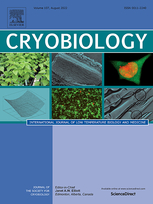
Activité de nucléation anti-givre de composites de polyphénol contre l'iodure d'argent.
Anti-ice nucleating activity of polyphenol compounds against silver iodide.
Auteurs : KOYAMA T., INADA T., KUWABARA C., et al.
Type d'article : Article
Résumé
Freeze-avoiding organisms survive sub-zero temperatures without freezing in several ways, such as removal of ice nucleating agents (INAs), production of polyols, and dehydration. Another way is production of anti-ice nucleating agents (anti-INAs), such as has been reported for several antifreeze proteins (AFPs) and polyphenols, that inhibit ice nucleation by inactivating INAs. In this study, the anti-ice nucleating activity of five polyphenol compounds, including flavonoid and tannin compounds of both biological and synthetic origin, against silver iodide (AgI) was examined by measuring the ice nucleation temperature in emulsified polyphenol solutions containing AgI particles. The emulsified solutions eliminated the influence of contamination by unidentified INAs, thus enabling examination of the anti-ice nucleating activity of the polyphenols against AgI alone. Results showed that all five polyphenol compounds used here have anti-ice nucleating activities that are unique compared with other known anti-INAs, such as fish AFPs (type I and III) and synthetic polymers (poly(vinyl alcohol), poly(vinylpyrrolidone) and poly(ethylene glycol)). All five polyphenols completely inactivated the ice nucleating activity of AgI even at relatively low temperatures, and the first ice nucleation event was observed at temperatures between -14.1 and -19.4°C, compared with between -8.6 and -11.8°C for the fish AFPs and three synthetic polymers. These anti-ice nucleating activities of the polyphenols at such low temperatures are promising properties for practical applications where freezing should be prevented.
Détails
- Titre original : Anti-ice nucleating activity of polyphenol compounds against silver iodide.
- Identifiant de la fiche : 30013364
- Langues : Anglais
- Source : Cryobiology - vol. 69 - n. 2
- Date d'édition : 10/2014
- DOI : http://dx.doi.org/10.1016/j.cryobiol.2014.07.009
Liens
Voir d'autres articles du même numéro (1)
Voir la source
Indexation
-
Analysis of supercooling activity of tannin-rel...
- Auteurs : KUWABARA C., WANG D., ENDOH K., et al.
- Date : 08/2013
- Langues : Anglais
- Source : Cryobiology - vol. 67 - n. 1
Voir la fiche
-
The basis for hyperactivity of antifreeze prote...
- Auteurs : SCOTTER A. J., MARSHALL C. B., GRAHAM L. A., et al.
- Date : 10/2006
- Langues : Anglais
- Source : Cryobiology - vol. 53 - n. 2
Voir la fiche
-
Differential effects of growth temperature on i...
- Auteurs : GURIAN-SHERMAN D., LINDOW S. E.
- Date : 04/1995
- Langues : Anglais
- Source : Cryobiology - vol. 32 - n. 2
Voir la fiche
-
Phospholipid analysis and fractional reconstitu...
- Auteurs : PALAIOMYLITOU M. A., KALIMANIS A., KOUKKOU A. I., DRAINAS C., ANASTASSOPOULOS E., PANOPOULOS N. J., EKATERINIADOU L. V., KYRIAKIDIS D. A.
- Date : 08/1998
- Langues : Anglais
- Source : Cryobiology - vol. 37 - n. 1
Voir la fiche
-
Ice nucleation in freeze-tolerant vertebrates.
- Auteurs : COSTANZO J. P., LEE R. E. Jr
- Date : 03/1996
- Langues : Anglais
- Source : Cryo-Letters - vol. 17 - n. 2
Voir la fiche
